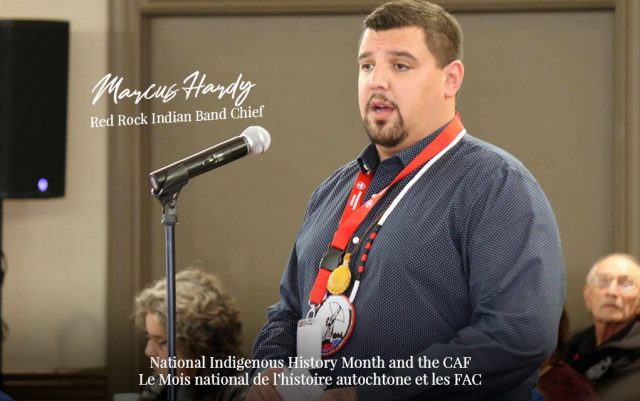For the eleventh year, Canadians unite to honour Indigenous “history, heritage, and diversity” throughout the month of June.
National Indigenous History Month was created after a unanimous motion was passed in the House of Commons in 2009. The observance is an opportunity to celebrate the contributions and cultures of First Nation, Inuit and Métis communities across the country.
Over the next 30 days, the Borden Citizen will highlight prominent Indigenous figures within the CAF, recognizing how this community has, and continues, to provide support to the armed forces and the rest of Canada.
This week, we’re featuring Canadian Forces veteran Marcus Hardy, Red Rock Indian Band Chief.
When Hardy was 17, he joined the Army Reserve in Thunder Bay – taking after his great uncles who served in the Second World War and great grandfathers who served in the First World War. Hardy joined the Forces out of “a sense of duty to serve his country and follow in his family’s footsteps.”
“I grew up in the Army,” Hardy commented. “I think a lot of my qualities [come] from being in that environment.”
In 2004, after serving four years, Hardy decided to “try his hand” at the Navy. During this time, he participated in humanitarian aid initiatives, such as hurricane Katrina in 2005, before transitioning back to the Canadian Army.
Hardy later deployed to Afghanistan from October 2009 to May 2010 with the 2nd Battalion Princess Patricia’s Canadian Light Infantry.
After serving 16 years, Hardy retired from the Forces in 2016, and now visits classrooms to speak about his experiences in the military.
“I show them pictures of what I’ve done overseas and what it looks like [over there],” such as the landscape, the people and the children. “It gives an experience for them to see how other people live in other parts of the world.”
In addition to this, Hardy also lays a wreath each year in his community on National Indigenous Peoples Day and in Waverley Park (Thunder Bay) on Remembrance Day for Indigenous Veterans, and others who served in Afghanistan.
A leader in the CAF and his community, Chief Hardy continues to advocate. In 2019, he “moved the resolution for Further recognition of Anishinabek Military Veterans, including to explore & implement supports [and] services for Anishinabek Veterans on Day one of the Anishinabek Nation Fall Assembly.”
Le Mois national de l’histoire autochtone et les FAC
Pour la onzième année, les Canadiens s’unissent pour rendre hommage à « l’histoire, au patrimoine et à la diversité » autochtones durant le mois de juin.
Le Mois national de l’histoire autochtone a été créé après qu’une motion a été adoptée à l’unanimité à la Chambre des communes en 2009. Cette motion constitue une occasion de souligner les contributions et les cultures des communautés des Premières Nations, des Inuit et des Métis partout au pays.
Durant les 30 prochains jours, le Citoyen Borden Citizen présentera des membres autochtones marquants des FAC et soulignera la façon dont cette communauté a soutenu les FAC et le reste du Canada, et continue de le faire.
Cette semaine, nous présentons Marcus Hardy, chef de la bande de Red Rock et vétéran des Forces canadiennes.
Lorsque M. Hardy avait 17 ans, il s’est enrôlé dans la Réserve de l’Armée de terre à Thunder Bay – reprenant ainsi le flambeau de ses grands-oncles qui ont participé à la Deuxième Guerre mondiale et de ses arrière-grands-pères qui ont pris part à la Première Guerre mondiale. M. Hardy s’est enrôlé en raison d’un sens du devoir qui l’a poussé à servir son pays et à suivre les traces de sa famille.
« J’ai grandi dans l’Armée de terre », a mentionné M. Hardy. « Je crois que j’ai acquis bon nombre de mes qualités grâce à cet environnement. »
En 2004, après avoir été membre des FAC pendant quatre ans, M. Hardy a décidé de « tenter sa chance » dans la Marine. Au cours de cette période, il a participé à des initiatives d’aide humanitaire, notamment après le passage de l’ouragan Katrina en 2005, avant de retourner au sein de l’Armée canadienne.
Ensuite, M. Hardy a participé à un déploiement en Afghanistan d’octobre 2009 à mai 2010 au sein du 2e Bataillon, Princess Patricia’s Canadian Light Infantry.
Après avoir servi dans les FAC pendant 16 ans, M. Hardy a pris sa retraite en 2016 et visite maintenant des écoles pour parler de son expérience dans les FAC.
« Je présente aux élèves des photos montrant ce que j’ai fait à l’étranger et à quoi cela ressemble là-bas », par exemple le paysage, la population et les enfants. « Cela leur permet de voir comment d’autres personnes vivent ailleurs dans le monde. »
En outre, M. Hardy dépose une couronne chaque année dans sa communauté à l’occasion de la Journée nationale des peuples autochtones et une couronne au parc Waverley, à Thunder Bay, à l’occasion du jour du Souvenir à l’intention des vétérans autochtones et aux autres vétérans qui ont effectué des missions en Afghanistan.
Leader au sein des FAC et de sa communauté, le chef Hardy continue de faire la promotion des FAC. En 2019, le premier jour de l’Assemblée d’automne de la Nation Anishinabek, il « a proposé une résolution concernant une plus grande reconnaissance des vétérans anishinabeks, dont le fait d’envisager et de mettre en place un soutien et des services à l’intention des vétérans anishinabeks ».
By/Par Zoe Côté












